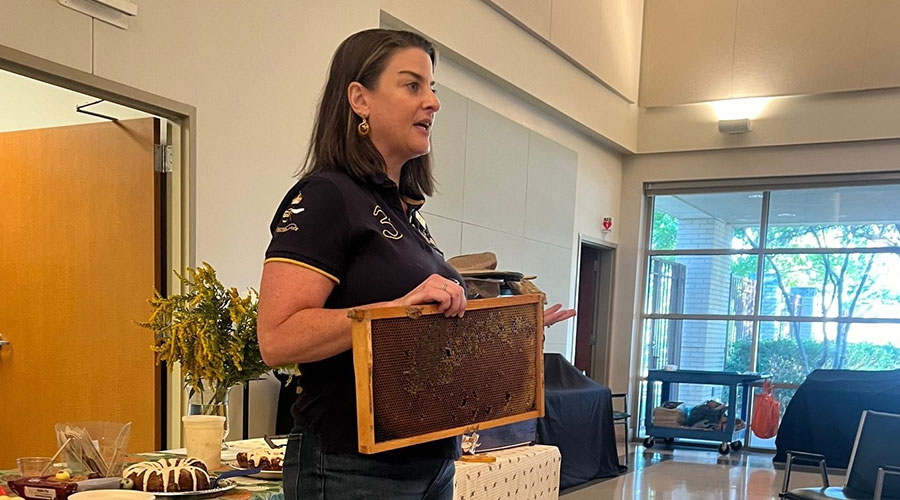
WELL-BEING MATTERS
Brought to you by Texas Health Community Hope
Well-Being Matters is an on-going series highlighting different members of our community, their strategies for well-being, and how they impact the well-being of those around them. Texas Health Community Hope engages in a broad range of innovative programs, investments, and collaborations outside hospital walls to promote a lifetime of holistic health and well-being. This month we meet Nikki Slobodin, a sixth-generation Texan and a certified Texas Master Naturalist. As an extension of her love of Texas native flowers and pollinators, she developed an interest in keeping honeybees. She makes presentations about beekeeping annually to the Fort Worth Stock Show and Rodeo. Over the last four years, she’s grown her apiary to four hives and two bee yards, and is passionate about both her bees and the native plants that sustain them.
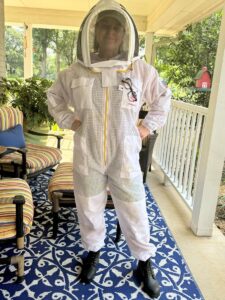 Q: Tell us about the inspiration for your beekeeping
Q: Tell us about the inspiration for your beekeeping
A: I always thought bees were cute, yellow, fuzzy – but I was scared to death of being stung. My brother passed away in 2015 from suicide. To deal with this overwhelming sadness, I would go outside as often as possible. Our holly bushes were covered in flowers and the bees were all over them. I began to watch them and found that I could get very close to them and was no longer scared of them. I just fell in love with them and their magic and energy.
Q: Your interest in bees led to what people may call a side-hustle?
A: My husband bought me a beginner beekeeping kit with a hive, suit, and smoker in December 2019. In 2020 I placed an order for bees; two months after COVID shut everything down I got my first bees.
 Q: And the honeybees also led you to an additional interest in the larger ecosystems?
Q: And the honeybees also led you to an additional interest in the larger ecosystems?
A: You start keeping bees and you get really interested in what they need for their own resources. That made me pay attention to all pollinators. Native plants don’t need as much water or effort to start up. I eventually became a Texas Master Naturalist and a member of the Native Plant Society of Texas. We promote the use of native plants to support the specific local ecology.
Q: We heard the world went through a crisis several years ago where bees were dying out?
A: It’s a product of globalization. The western honeybee came into contact with a parasite that it couldn’t deal with due to global shipping. Beekeepers have had a problem with the Varroa mite, which attacks and feeds on honeybees. That caused a total collapse of colonies very suddenly. Pesticide and herbicide use didn’t help either.
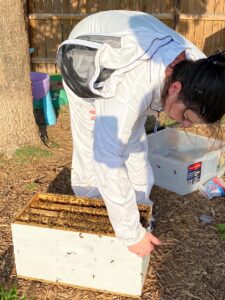 Q: Do we still face this challenge?
Q: Do we still face this challenge?
A: Eventually the bees have been able to deal with the mites; bees have a fairly short lifespan and evolve and adapt pretty quickly. Science is also working to encourage the genetic lines that can deal with this challenge.
Q: But natural disasters like Hurricane Helene also devastate bee habitats, right?
A: I believe a handful of beekeepers went to North Carolina to help after Helene. Bees and all agriculture are affected by the changes in global weather. It’s not just damage to homes and people but to the food supply chain.
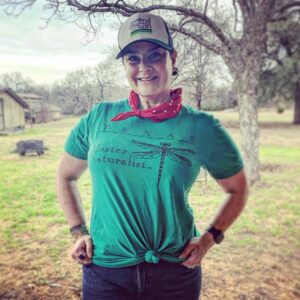 Q: This has been an almost 10-year journey for you, and now you have a small business.
Q: This has been an almost 10-year journey for you, and now you have a small business.
A: I sell native plants and products from the honeybees – honey and wax. I named my businesses after my kids: Nat’s Natives and Hank’s Hives. This is the first year I’ve sold honey. It’s more of a hobby. Large-scale commercial beekeeping makes it difficult to get honey as God intended.
Q: How so?
A: Beekeeping management strategies often involve a simple syrup mixture that’s a synthetic version of nectar. I try to shy away from this unless I feel they’re going to starve over a winter. Pollen is immunotherapy but if you’re buying commercial honey from bees that have been fed sugar syrup, you’re not getting the local pollen.
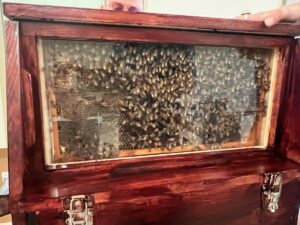 Q: Like everything, bees have seasons when they’re productive and seasons when they rest.
Q: Like everything, bees have seasons when they’re productive and seasons when they rest.
A: Beekeepers refer to this as dearth – lack of resources. A bee famine, if you will. Bees don’t have abundant resources. The bees live in a natural rhythm with seasons and that’s the whole point of honey. They don’t make it for us. Managing hives responsibly is making sure the bees have enough food stored to get them through dearth. I never take more honey than I need, and I leave enough for them because it’s their food source.
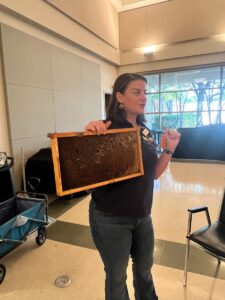 Q: And honey is also seasonal, right?
Q: And honey is also seasonal, right?
A: Honey production depends on the nectar sources. In the spring, bees are pulling from wildflowers around Texas. Near my house we have 100 acres of pastureland covered in wildflowers like bee balm, firewheel, and bluebonnets. The diverse mixture of nectar makes the honey lighter and more complex tasting with a lot of herbaceous floral notes. Fall honey comes from aster flowers like goldenrod, which grows in the fall and is less sugary-tasting with more earthy notes.
Q: Talk about the importance of native plants. Some days it seems that the main crop we grow in North Texas is lawns.
A: Americans in general are obsessed with lawns, but lawns create a food desert for pollinators because the lawns are a monoculture. We use foreign, invasive grasses, then people spray herbicides and pesticides that damage the native ecology all up and down the food chain. We’re not growing any grass at my house. Does it look pretty? No. That’s something I let go of a long time ago. I grow as many wildflowers as I can and it’s created my own mini-biosphere – honeybees, so many butterflies, and bumblebees.
 Q: What are some of the benefits of forgoing a lawn for natural plants?
Q: What are some of the benefits of forgoing a lawn for natural plants?
A: Native plants do things that invasive plants can’t do, including erosion mitigation. The idea of a carpet green lawn was created so people would buy chemicals and products you’d never need to have if you didn’t associate this green carpet with your success. It’s very punk rock to divest of this idea.
Q: What’s the best thing that we can do to help bees?
A: Plant native flowers and plants. And don’t use herbicides in your yard. Leave dandelions in the yard in the winter and spring – they’re some of the only food available for the bees. Henbit is vitally important for pollinators in the winter, when bees desperately need pollen and nectar. We think of these as weeds but they’re very important for pollinators.
Learn more about Texas Health Community Hope at TexasHealth.org/CommunityHope
